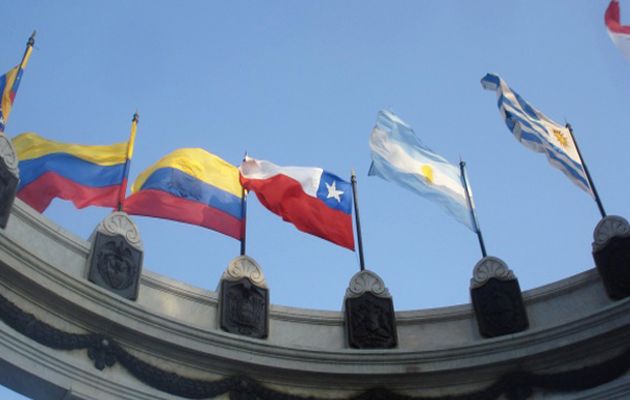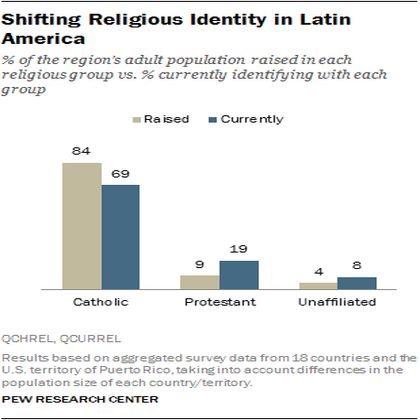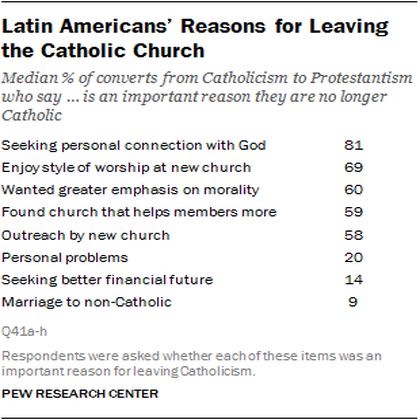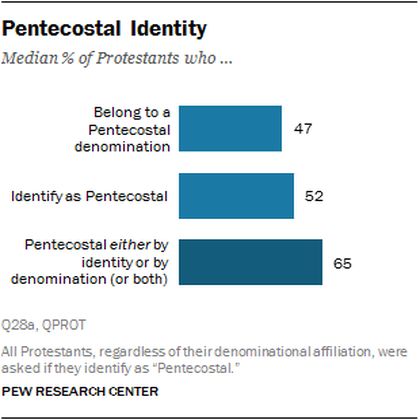Growing Protestant presence in Latin America
Almost 20% of Latin Americans identified themselves as Evangelicals. Catholic Church has lost members through religious switching.
Protestante Digital, Pew Research · MADRID · 02 FEBRUARY 2015 · 10:55 CET

Nearly 40% of the world´s total catholic population lives in Latin America, but that is changing because of the growth of Protestantism. According to Pew Research, right now 19% of the Latin Americans are Protestants, and identification with Catholicism has declined throughout the region.
The Pew Research Center survey quantified and analyzed religious affiliations, beliefs and practices in 18 countries and one U.S. territory (Puerto Rico) across Latin America and the Caribbean, and it came to the conclusion that one in five Latin Americans identified themselves as Evangelicals.

CATHOLIC BACKGROUND
The survey said that 84% of Latin Americans adults recognized that they were raised Catholic, 15 percentage points more than currently identify as Catholic. The pattern changed among Protestants and people who do not identify with any religion: While the Catholic Church has lost members through religious switching, both Protestant churches and the religiously unaffiliated population in the region have gained them.
Only one of ten Latin Americans (9%) were raised in Protestant churches, but almost one of five (19%) now describe themselves as Protestants. And while only 4% of Latin Americans have grown without a religious affiliation, twice as many (8%) are unaffiliated today.
Much of the change from Catholicism to Protestantism in Latin America has occurred in the span of a single lifetime. In fact, in most of the countries surveyed, half or more of the current Protestants said they were baptized as Catholics.
For example, nearly three-quarters of current Protestants in Colombia were raised Catholic, and 84% say they were baptized as Catholics.
The survey asked former Catholics who have converted to Protestantism why they did so. Of the eight possible explanations offered on the survey, the most frequently answered was that they wanted a more personal relationship with God. Many others also explained that they became Protestants because they wanted a different way of worship, or a church that helps its members more.
Smaller percentages of converts to Protestantism also gave other reasons, such as personal problems (20%) or marriage to a non-Catholic (9%).

PENTECOSTAL GROWTH
The term “Evangelical” includes many Christians who belong to Pentecostal churches. While practices vary, Pentecostal worship services often involve experiences that believers consider “gifts of the Holy Spirit,” such as divine healing, speaking in tongues, prophesy and some others.
In all the countries surveyed, an average of nearly two- thirds of Protestants considered themselves Pentecostal Christians, either because they belong to a Pentecostal denomination (47%) or because they personally identify as Pentecostal regardless of their denominations (52%). Some identified as Pentecostal for both reasons.
At least half of Protestants reported that they had witnessed or experienced the divine healing of an illness or injury, and at least a third said they had witnessed exorcisms.
Pew Research also asked in the survey about “speaking in tongues”, a practice closely associated with Pentecostalism around the world. In most of the countries polled, at least one of five Protestants said they personally had spoken in tongues, specially in Panama (39%) and in Brazil (33%).

Other topics of the survey were the social, political, or economic views of the converts from Catholicism to Protestantism, Pope Francis' influence, or the relationship between Faith and Science,among others. You can read the whole Pew Research study here.
Published in: Evangelical Focus - world - Growing Protestant presence in Latin America
